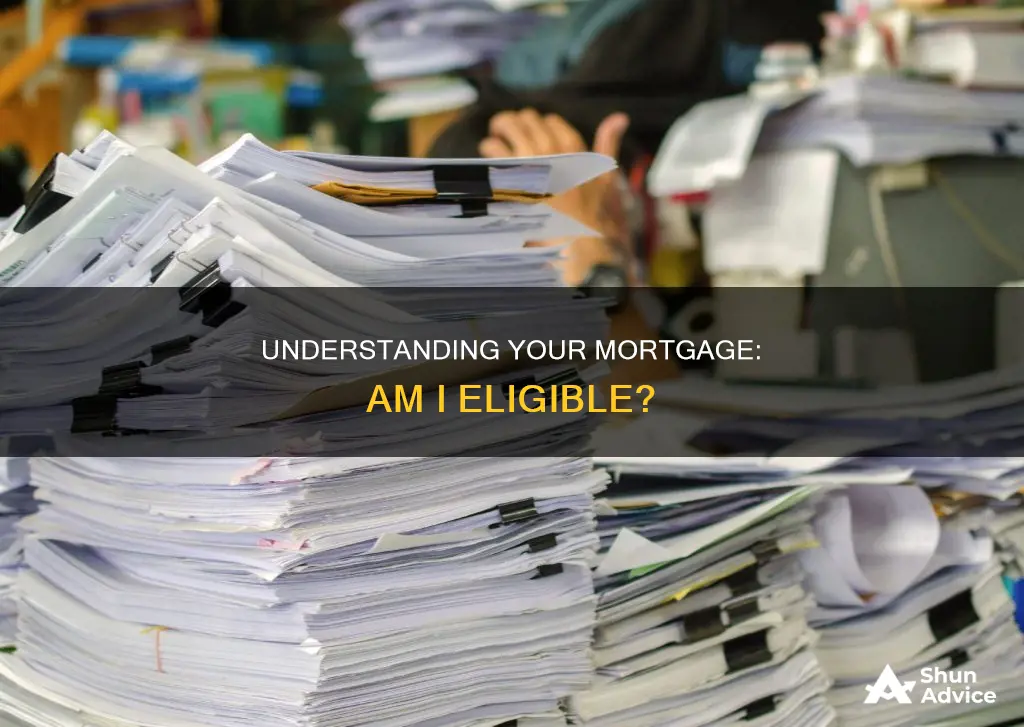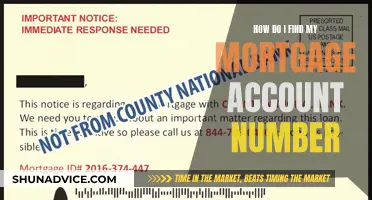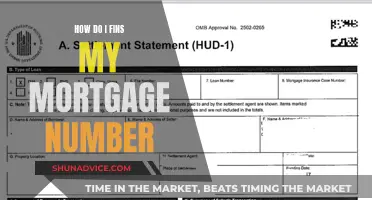
If you're wondering whether you have a mortgage, there are a few ways to find out. One option is to contact your loan servicer online, by phone, or by written request. Your servicer is obligated to provide you with the name, address, and telephone number of the owner of your loan, which could be a bank, lender, or another financial company. You can also try searching for public records at the county clerk's office, which are often available online. Additionally, if your mortgage is owned by Fannie Mae or Freddie Mac, you can use their online mortgage lookup tools.
How to know if you have a mortgage
| Characteristics | Values |
|---|---|
| Who owns your mortgage | Look up online, call, or send a written request to your servicer |
| Where to find the number for your mortgage servicer | On your monthly mortgage statement or coupon book |
| What to do if you don't know who owns your mortgage | Use online tools such as Fannie Mae and Freddie Mac's mortgage lookup tool |
| What to do if you don't understand the title report | Consult an attorney or contact the county clerk's office (usually called the Registrar of Deeds) |
What You'll Learn

Contact your loan servicer
If you're unsure whether you have a mortgage, one of the best things to do is to contact your loan servicer. Your loan servicer is the company that you pay your mortgage to each month. They are responsible for the management and collection of your loan, and they have a wealth of information about your loan, including who owns it.
You can contact your loan servicer by phone, online, or by sending a written request. Their telephone number and mailing address should be listed on your monthly mortgage statement. If you are unsure who your loan servicer is, you can find this information on your monthly mortgage statement or coupon book.
When you contact your loan servicer, they are obligated to provide you with information about your loan, including the name, address, and telephone number of the owner of your loan. This is useful if you want to know who your mortgage is with, as many mortgage loans are sold, and the company you pay each month may not own your mortgage.
If you are having trouble paying your mortgage on time, your loan servicer should be your first call for assistance. They will want to help you and can provide you with options for getting help with your mortgage. You can also use online tools provided by mortgage companies like Fannie Mae and Freddie Mac to look up who owns your mortgage.
Finding Your Wells Fargo Mortgage Balance: A Guide
You may want to see also

Search public records
Public records allow society to remain informed about people, properties, taxes, and other issues. Freedom of Information (FOI) laws give the public access to certain data held by the government. This includes court documents, marriage certificates, and public mortgage records.
To search for public mortgage records, you will need to gather some basic information. This includes the property address, which can be found on the sales listing page, or the owner's name. If you are missing both the address and the owner's name, you can contact a real estate agent to help you obtain this information. Once you have the address, you can search for the property on sites like Zillow, Trulia, or Redfin, which can provide information on homes that are for sale and off-market.
After obtaining the address or owner's name, you can visit the county clerk's office or public records website to access the mortgage records. Some counties allow you to search online, while others require an in-person visit. Basic searches are typically free, but some counties charge a small fee for access or offer "premium" access for additional features. For example, Camden County, New Jersey, offers free basic access and premium access for $25 per month.
Through a public records search, you can uncover information such as the borrower's name, property address, maps or surveys of the property, square footage of dwellings, property value, previous sales listings, and tax assessment history. This information can be useful for potential buyers when making an offer on a property.
Understanding Your Mortgage Grace Period: What You Need to Know
You may want to see also

Use online tools
If you are unsure whether you have a mortgage, there are several online tools you can use to find out. Firstly, you can search the public records at the county clerk's office (or the local equivalent). These days, most mortgage records are searchable online, and a phone call to the county offices can point you in the right direction. The area you are searching in might have a specific name for the office, such as the Registrar of Deeds. However, if you are new to searching these records, you may not know what some of the filings mean, so it is important to understand the title report. If you don't have the actual title documents, you may need an attorney to help you with this process.
Another option is to contact your loan servicer, who is obligated to provide you with the information you need. You can do this online, by phone, or by sending a written request. You can find the contact information for your mortgage servicer on your monthly mortgage statement or coupon book.
There are also some online tools you can use to look up who owns your mortgage. For example, both Fannie Mae and Freddie Mac offer a mortgage lookup tool on their websites. To use these tools, you will need to enter your information carefully, as small mistakes can cause inaccurate results.
FHA Mortgage Problems: Quick and Easy Solutions
You may want to see also

Understand title reports
A title report is a vital tool used during real estate transactions to ensure clear title and minimize risks. It includes details such as ownership transfers, liens, and encumbrances. This report is essential for buyers, sellers, and lenders to ensure a smooth real estate transaction. A preliminary title report is an initial assessment of a property's title status obtained during real estate transactions. It identifies potential issues like liens, encumbrances, or ownership disputes that could affect the transfer of ownership.
A property title search examines public records to confirm a property’s rightful, legal owner. A title company or attorney typically takes care of the title search. In some cases, a lender or home buyer may conduct the title search. If you tackle the title search yourself, you can find the records you’ll need at places such as the county courthouse, recorder’s office, and assessor's office. It may be a good idea to let professionals, such as real estate attorneys, handle this part of the home-buying process.
When examining a preliminary title report, it's essential to verify the accuracy of ownership information, identify any existing liens or encumbrances that may affect the property's marketability, and assess the validity of recorded easements or restrictions. A lien is the legal right to force the sale of the property to satisfy a debt of the owner (or a prior owner). The loan you take out to buy a home is a common type of lien. If you default on that loan, the lender can foreclose the lien, which means the house is auctioned and the proceeds used to pay the debt. Covenants, conditions, and restrictions, also known as CC&Rs, are rules that homeowners must follow in planned communities or common-interest developments. They might determine whether you are allowed to park on the street, what kind of fence you can put up, or what color you can paint your house.
Finding Mortgage Interest Paid: A Guide to Your Payments
You may want to see also

Ask your title agent
If you're unsure whether you have a mortgage, one of the best people to ask is your title agent. A title agent or title company plays a crucial role in the real estate process, and one of their main functions is to resolve any issues that could affect your ownership rights. They do this by searching through public records, including deeds, mortgages, wills, court judgments, tax records, and liens, to verify who the current owners are and determine if there are any problems that could impact your rights as the owner.
Additionally, title companies handle all the paperwork and coordinate the closing process, ensuring a safe and effective way to transfer funds. They can also help sellers obtain payoffs from lienholders that are uncovered during the title research process. While the title company cannot remove these liens, they can facilitate the process of obtaining the necessary payoffs.
If you don't know a title agent, you can ask your lender or real estate agent for recommendations. You can also ask friends and family who own homes and check reviews online to find a reputable and knowledgeable title company or agent.
Understanding Your Mortgage: Finding the Principal Balance
You may want to see also
Frequently asked questions
You can find out if you have a mortgage by contacting your loan servicer online, by phone, or by written request. You can also check the public records at the county clerk’s office, which are often searchable online.
Your mortgage servicer is the entity that you pay each month. You can find their contact information on your monthly mortgage statement.
You can use online tools to look up who owns your mortgage. Many mortgages are owned by Fannie Mae and Freddie Mac, which offer mortgage lookup tools on their websites.
A mortgage servicer is the entity that you pay each month for your mortgage. They are responsible for collecting your payments and handling your escrow account, if you have one.
The mortgage servicer and the mortgage owner may be the same entity, but not always. Many mortgage loans are sold, and the servicer you pay each month may not own your mortgage.







